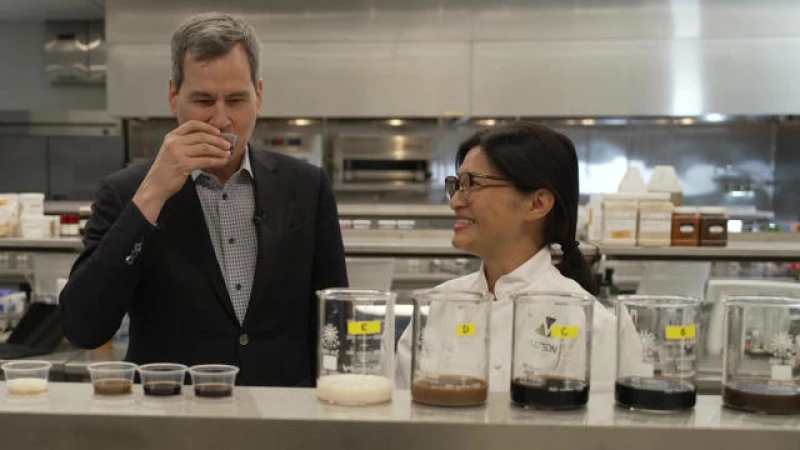Tang. Swanson's TV dinners. Wow Chips. BacOs. Since the dawn of dinner, food fads have formed, and fizzled. But who's behind them?
Sherry Frey is an Insights Executive at Nielsen IQ in Chicago, a spinoff from the Nielsen TV-ratings company. She analyzes the public's food purchases and spots the trends.
These days, here's a big one: "Consumers are savvier than ever about what they're putting in their bodies, and the impact that it has on their health, but also the health of the planet overall," Frey said.
Not all of the trends will strike you as obvious, like the spike in mushrooms. Frey said, "We're seeing this in beverages (Om Mushroom Hot Chocolate Blend). We're seeing it in baked goods (Gwell Reishi & Chaga Tea Cookies), shiitake salad dressing (Annie's Shiitake Sesame Vinaigrette)."
Also trending: sea vegetables, with kelp burgers, and a variety of seaweed chips and snacks.
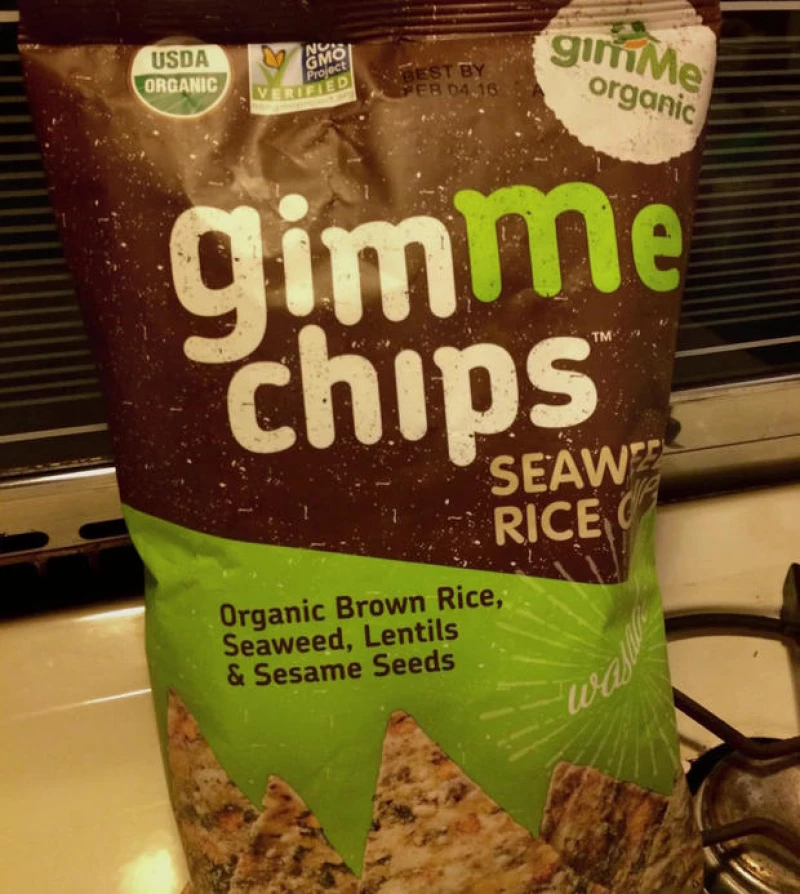
And, products with ingredients thought to lower your stress levels, like ashwagandha.
Pogue asked, "So, it's possible that in 2024, I might see a favorite sports drink, 'now with ashwagandha'?"
"You already do!" Frey laughed. [Yep, there's Empowered Elixir's Organic Strawberry Lemon Basil Infused Green Tea, with Ashwagandha.]
Food Companies Turn to Mattson for Recipe Innovation
When a food company embraces a trend by introducing a new product, here's a big secret: sometimes they outsource the recipe. Why? Because it's often more efficient just to hire Mattson, a food development lab near San Francisco.
But wouldn't a DiGiorno or a Mrs. Fields have their own chefs? "Well, sometimes they're trying to get into new space, and they don't know quite how to do that, and they'll come and ask for our help," said Katie Hagan, Mattson's Insights Executive.
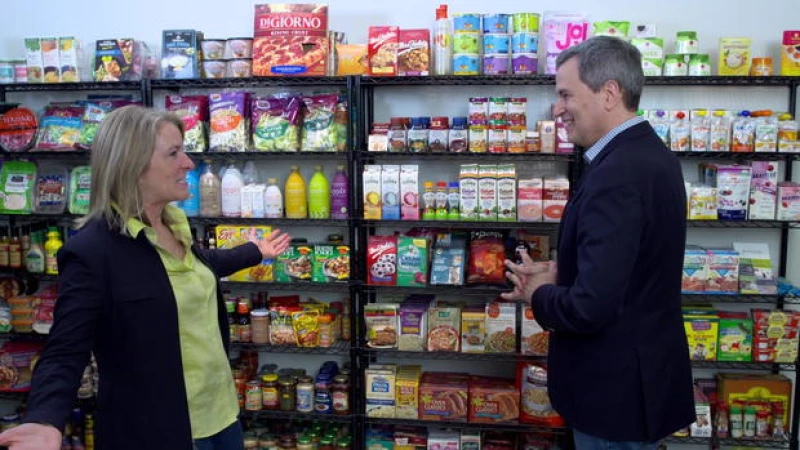
But how does Mattson know where tastes are going? By watching young people. According to Hagan, "If you ask a Gen Z what's their favorite food, what are they gonna say? Mexican, and then second is Chinese. And you also have a rising Hispanic population in the United States, which feeds into the desire for Latin cuisines as well."
On the day "Sunday Morning" visited, Mattson scientists were working on a new line of protein-infused coffee. "It's a lotta trial and error," laughed one staffer.
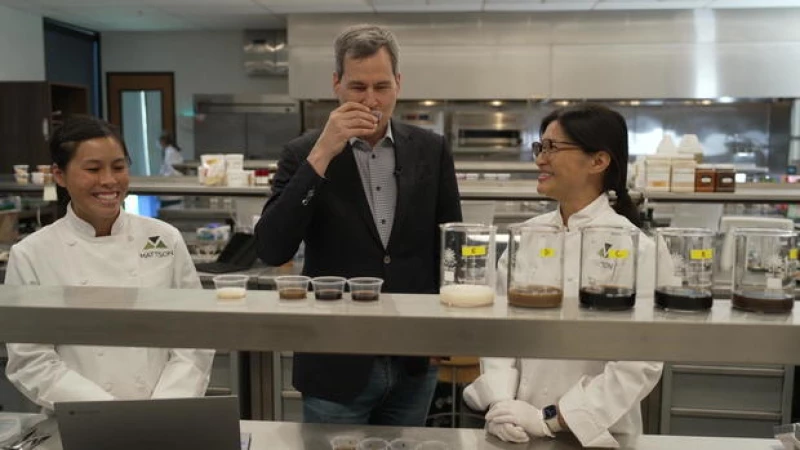
They also showed iterations of their keto empanadas (low-carb, high-fat). Their first attempt wasn't a hit. "It's a little mushy," said Jared. "We weren't able to get to the right type of dough."
Six months later, after more than 100 different formulas, they came up with the version that Pogue sampled. "That's really good," he said. "What am I missing because it's keto?"
"Hopefully nothing!" laughed Melanie.
Mattson client Lance Lively works for a precision fermentation startup. He and Mattson Innovation Chief Barb Stuckey served Pogue breakfast. "We are working on the future of food," Stuckey said.
But what they served wasn't a real egg. According to Lively, "The egg that you're eating right now does in fact contain real egg protein. But here's the thing: That egg protein did not come from a chicken. Our egg protein comes from yeast. So, no cholesterol and no saturated fats."
"Nobody in a million years would say this doesn't come from an egg, no way," Pogue said. "So, why don't we want the actual chicken eggs?"
"The way that we need to think about producing food in the future has to change," said Stuckey. "We're gonna have too many humans on earth and we're not gonna have enough land, we're not gonna have enough water."
Lively said developing eggs without chickens means "We're able to produce completely indistinguishable products at a fraction of the sustainability impact."
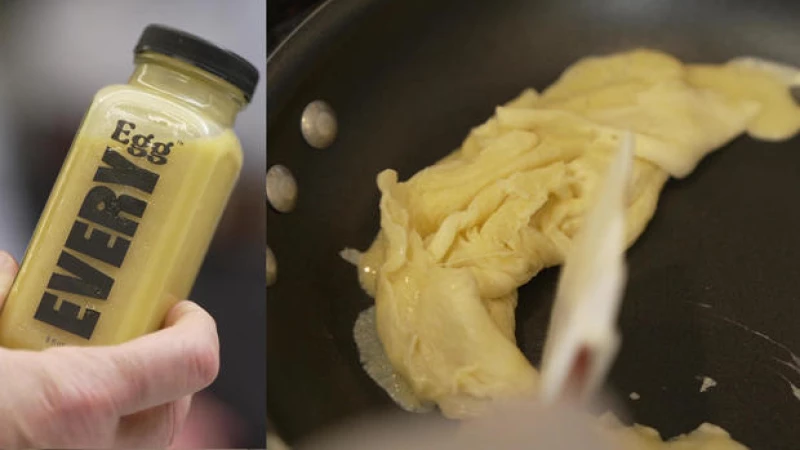
Finally, before a new food can become a hit, it has to be advertised. "The goal for a new product is awareness and memorability," said Andrew Swinand, CEO of the Leo Burnett ad agency in Chicago, which was behind some of the most famous ad campaigns in history.
"They're grrrrrrrrrrrrreat!," said the spokesperson from the advertising agency, Leo Burnett, known for creating some of the most iconic characters in the industry.
"So, let's say I've invented a new keto mushroom-based lemonade, and I want to hire you," inquired Pogue.
"Decades ago, you would do a TV ad and run it, and you'd be able to reach 50% of the U.S.," explained the spokesperson. "Today, a lot of it is social."
As in social media. These days, you have to generate buzz online. For example, to promote Bear Naked Granola, the agency mapped trails that are friendly to naked hikers. "Incredibly successful," the spokesperson added.
And so, in the new year, the tastemakers will be giving us food that's healthier and better for the planet; more Mexican and Asian food; and, according to Nielsen IQ's Sherry Frey, more pumpkin spice, which can be found in products throughout the aisles. "This is a 20-year trend," she laughed.
"When does it peak?" asked Pogue.
"We're asked this every year, about what's happening with pumpkin spice. I think we're all wondering if there'll ever be a point that it'll peak!" replied Frey.
For more info:
- NielsenIQ
- Mattson, Foster City, Calif.
- Leo Burnett Worldwide advertising agency
Story produced by Dustin Stephens. Editor: Steven Tyler.
"Sunday Morning" 2023 "Food Issue" Recipe Index
Discover mouthwatering menu suggestions from renowned chefs, acclaimed cookbook authors, celebrated food writers, innovative restaurateurs, and the esteemed editors of Food & Wine magazine.

